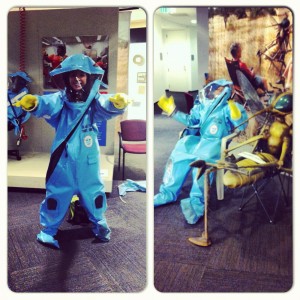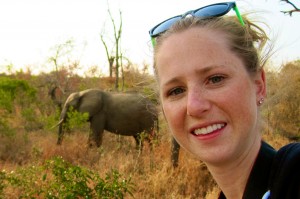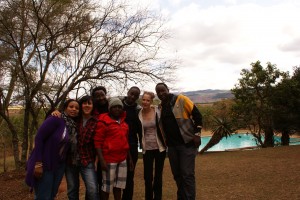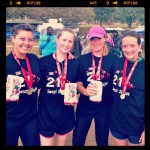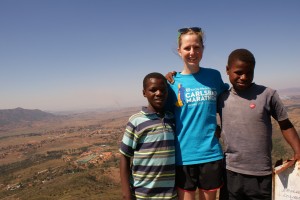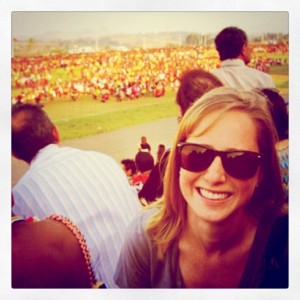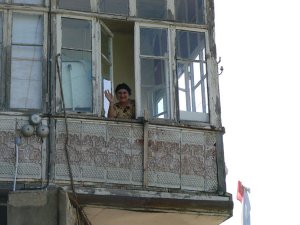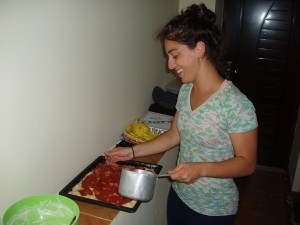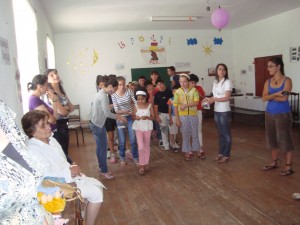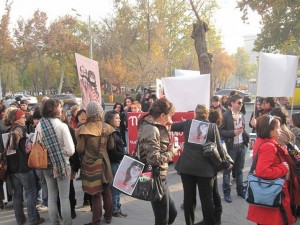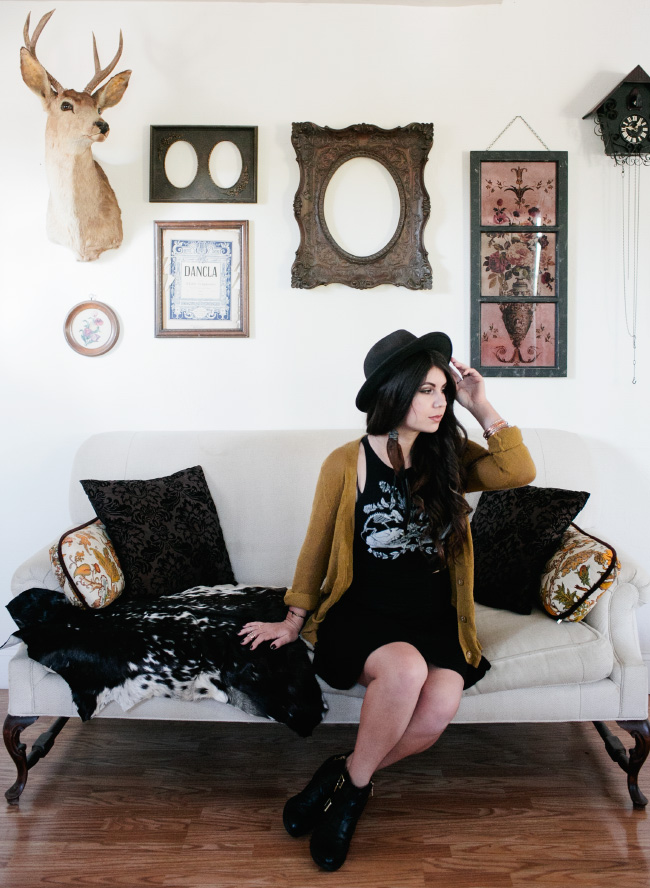Career Center Rebel is a guest blog series written by Erica Spiritos, a Soul Searcher and Idealist. Erica is bold and silly and in 2011 she started her journey to uncover her passion and place in the world as an unconventional engineer. We are re-posting pieces of her journey for other recent grads that can relate. Views expressed in these posts belong to Erica and may not reflect the views of the NGS Movement.
Read Part 1 here.
Pesto on my Fried Egg Sandwich?
Originally written on December 13, 2010
I like to think of myself as an eggspert. No, seriously, I really love eggs – scrambled, over-easy, poached, soft-boiled – and I think I’m pretty adventurous when it comes to cooking eggs. I know most people stick with the traditional cheese (I’m lactose intolerant so I don’t typically do this) and tomato… maybe you throw a little onion in, or some peppers and mushrooms. But as a college student who makes it to the grocery store once every two weeks, I’ve learned to eggsperiment (haha, I know I’m so cheeeeesy).
The other day, I was making scrambled eggs for dinner, and as I scanned the shelves of my refrigerator, I realized I didn’t have any traditional egg add-ins. But I had pesto, and I decided to give it a shot because, heck, what’s the worst that could happen? Well anyway, I was slightly nervous because my roommate was also in the kitchen cooking pasta as I was cooking my eggs, and I noticed her eyeing my creation rather skeptically. And so I almost felt like I had something to prove. Like, “I know this looks weird (I had whisked the pesto into the eggs) but I’m really hoping it’s going to be great so please refrain from making any remarks just yet.”
Well, it was amazing!! And I was so excited by my successful attempt at an unconventional creation (can you see where I’m headed with this?) that I started to eggsperiment even more! Today I put tomato sauce on my fried egg sandwich (delish) and all of a sudden I have all these ideas for foods I can start adding to my eggs. Why didn’t I think of them sooner? And why was it only after I was willing to try something different was I exposed to an entirely different, potentially superior, world of eggs? Well then I realized, as I was flipping my eggs with my egg spatula, that thinking outside the carton (box) transcends the kitchen – it applies to my job search!
This morning, as I was (not) studying for my Spanish final, I came across a website called Matador Network – the world’s largest independent travel magazine. After getting lost in some really incredible essays on this website, I stumbled upon an article featuring Sean Aiken, a guy who took one year after graduating from college to find his passion by working 52 different jobs in 52 weeks. I was really blown away by this, and I think what inspired me the most was that he came up with an idea that worked for him.
This is a guy who was not afraid to put pesto on his egg sandwich, even as people watched skeptically. He didn’t know what he wanted to do with his life, and so instead of sticking with the traditional cheese and tomato (9-5 desk job), he broke the mold. And I think that is totally awesome.
An Exercise in Accounting: About as boring, yet informative, as the title.
Originally written on Sunday December 25, 2010
A couple of months ago, my Dad visited me in Pittsburgh to spend some one-on-one time talking about “job stuff”: what I was looking for, companies I might be interested in, contacts and resources that I have collected over the past four years. Truthfully, the weekend was not so successful in this regard because we were searching the Internet (Google) before I really started to get in touch with me Innernet. Nevertheless, as one of what seemed like a thousand unanswerable questions, my dad asked me how much money I thought I would like to make next year.
This is a really loaded question.
My first reaction was, I’ll admit, one of disgust. I was upset that he was asking me about money when I felt that this was really the last item on my list of priorities. I want a purpose, a reason to get up in the morning, and to be a part of something that is larger than myself, my company, and my financial needs. I felt like he was missing the point. I didn’t see how money factored into the equation at all, because, the way I saw it, I would make it work! Maybe it would even be fun for a little while… to be forced to be creative and resourceful. So what If I have to live off oatmeal? That builds character, right?
But I couldn’t shake this notion that perhaps I was being slightly Romantic, and perhaps elitist? After all, a Carnegie Mellon education costs a small fortune. Was I selling myself short in my willingness to live so minimally? Maybe I don’t feel compelled to compete with my friends who will earn upwards of $80k in their first year of work as a Chemical Engineer, but livin’ isn’t exactly $Free.99. Do I have to resign myself to a low salary in order to do the kind of hands-on, small project, start-up work that I want to do?
While I am not aiming for the status or security that comes with a large salary, it is naïve of me to think that I could (or should) live paycheck to paycheck. I decided to actually try to answer the question: How much money would I like to make in my first year of work? As in, how much money does it cost to LIVE? I didn’t want this number to just come from out of the blue – plucked from the list of average starting salaries for engineering majors graduating from Carnegie Mellon, or an amount similar to what my friends would be earning next year doing more traditional engineering work. For now, all I would like is to be self-sufficient. So this is how I broke it down:
It seems to me that housing is by and large the most expensive part of living. It’s also probably one of the factors that vary the most depending on where one decides to live after graduation. Over the past couple of years, I’ve realized that environment matters to me. Ask my Mom and she’ll tell you that the happiest she’s ever seen me was during my time in Montana, where I could run and bike and ski and go for a hike whenever I wanted… where I found peace connecting with myself in nature.
So, here’s my thinking: I don’t want to live in New York City (my hometown, if you can call NYC a hometown). I don’t feel compelled to stay in Pittsburgh, and at this point, my gut tells me that if I don’t end up moving to some country in South America, I’ll probably move to some place in or near the mountains. In Pittsburgh, I live with four roommates and my portion of the rent is $450 per month, plus utilities. In Montana, my rent was $367 per month. But to be on the safe side, let’s say I end up living in an outdoorsy city (Portland, OR?), so maybe rent costs $800 per month (utilities included).
I will be the first to admit that I love food, and farmer’s markets, and cooking, and having people over for dinner. But as a student, I don’t have the time to have as much fun in the kitchen as I might like, and so I keep it pretty basic. When the farmer’s markets are in season, I’ll buy produce from Jeff (my favorite farmer) every Wednesday outside of Phipps Conservatory, but in general, I shop at Giant Eagle and Trader Joe’s. This is a typical shopping list: granola, yogurt, oatmeal (once every couple months), apples, bananas, eggs, soymilk, quinoa (in bulk from the Co-op), lots of greens, squash, sweet potatoes, chocolate covered something (raisins, pretzels), and maybe a couple other things that look interesting. I probably spend a little over $100 per month on food. But hopefully in the future I’ll have more dinner parties, and maybe I’ll drink some wine, so let’s budget for $200.
Clothing. I really hate shopping, and I am not the biggest fan of the American consumer culture that we’ve gotten so accustomed to. I buy clothes when I am home in New York over winter or summer break when there are things that I really need. I’m learning (from my mom, who is a pro) to make economical purchases – to invest in a few great things that I will have for years, rather than to buy cheap stuff that won’t last. I don’t even know how to budget for clothing, because I really think that depending on where I’m working, I could go all year without buying a single thing. But, let’s say I need to buy a pair of heals (god forbid) or some nice dress pants or a blazer or a handbag. I will allocate $100 per month.
As someone who thinks showers are often over-rated, this is an expense that I originally overlooked. But have no fear, my Mom reminded me that I do need to wash my clothes, and I do still need to buy toilet paper. And I’ll need soap, shampoo, razors, deodorant, tampons, toothpaste, and maybe a new toothbrush every once in a while. What sounds reasonable for personal hygiene? Let’s say $100 per month.
The idea of owning a car is very scary to me, on several levels. But if we disregard the fact that I have only been a licensed driver for five months (thank you very much!) I just don’t really see myself as a car person. But what if I live in the boonies? I’ll need a car! Having grown up in NYC, I am quite fond of public transportation, although I will admit that the inconsistency of the Pittsburgh bus system has inspired a romance between my bicycle and I that is infinitely more personal and reliable. All this just goes to say that I have no idea how much I will need to spend on transportation. Will I need to buy a car and pay for gas? Will I need to buy an unlimited ticket for public transportation? Will I only need to buy spare tubes for my tires? Again, I’ll be conservative and assume the worst: $200 per month. (editors note, this is not conservative, try closer to $600, this would include a car payment, car insurance, oil changes and repairs)
This is another expense that almost slipped my mind, until I remembered that I would like to be able to visit my family and friends, wherever they and I might be. Granted, if I’m on another continent it won’t be so feasible for me to just go visit a friend one weekend. But if I am in the states, it is worth it to me to spend some money on airfare or a train ticket to go visit the people I love. How often I visit depends on where I relocate, but hopefully I see my peoples at least a couple times a year! I don’t know how to budget for this because I have no clue where I’ll be, but let’s just say $75 per month.
This category would include going out for dinner and/or drinks with friends, occasional live music, movies, etc. Does $200 per month sound reasonable?
Phone. This is the final straw. If I want to be completely self-sufficient, I will have to pay my own phone bill. Skype will prove to be a life (read: money) saver if I live outside the U.S., so I think it’s safe to assume that all calls will be domestic – $50 per month. (editor’s note: Unless you plan on having a “dumb” phone that you purchase minutes for, better make this $120)
I made this category because I have learned that in order for me to be a productive person out there in the world, and to make meaningful contributions, I need to take care of myself. This part of the budget includes all purchases that serve my physical, mental, and emotional wellbeing: Yoga classes, running sneakers, books, and music, for example. Yes, I could choose to limit myself, buy yoga videos on DVD and practice in my living room. But for me, part of what makes Yoga so special is the community, and the energy in the room that radiates from all of the other people who I don’t know a thing about, but to whom I feel connected. I would say that yoga also counts as my healthcare, but my guess is that I’ll probably (hopefully) be insured. Some things, I think, are worth the extra money: $200 per month.
Monthly Expenses:
Housing: $800
Food: $200
Clothing: $100
Toiletries: $100
Transportation: $200 ($600)
Travel: $75
Entertainment: $200
Phone: $50 ($120)
Wellbeing: $200
Monthly Total: $1925
Annual Total: $23,100
Salary: $25,000 (Editor’s Note: Erica did not account for taxes, you would need a salary closer to $33,000 to take home $23,100)
This number looks really low, but it’s pretty amazing all that it can buy. I’m not saying that, if asked in an interview how much I would like to earn, I would say $30,000, but it’s helpful to know that if this is all I made – or if I earned less – I would be A-okay.
Searching for Jobs á la Smorgasbord
Originally written on Thursday, January 6, 2011
Last night, I read the following passage from a book my mom gave me to read, Women Who Run With the Wolves by Clarissa Pinkola Estés:
“Imagine a smorgasbord laid out with whipped cream and salmon and bagels and roast beef, and fruit salad, and green enchiladas and rice and curry and yogurt and many, many things for table after table after table. Imagine your survey it all and that you see certain things that appeal to you. You remark to yourself, ‘Oh! I would really like to have one of those, and one of that, and some of this other thing.’ Some women and men make all their life decisions in the way. There is around and about us a constant beckoning world, one which insinuates itself into our lives, arousing and creating appetite where there was little or none before. In this sort of choice, we choose a thing because it happened to be beneath our noses at that moment in time. It is not necessarily what we want, but it is interesting, and the longer we gaze at it, the more compelling it becomes.”
I thought about the times I have done something because it was convenient, all the while subconsciously convincing myself that it was exactly what I wanted to do. I thought about how easy it is to get sucked into this trap in which what is available is more enticing than it would otherwise be, just because I am desperate for something. I thought about relationships I have had not because we were compatible, but because I wanted a boyfriend, and he was there. And then I thought about Teach for America, a program I applied for because it looked interesting, and I felt I needed a plan.
Sometime around October, my friends started getting job offers. All of a sudden, it seemed that people had plans for next year, and that my friends and professors and family expected me to have an idea of what I was going to do after graduation. But I didn’t have a plan, and what’s more, I hated answering the “future” question with an apprehensive, “I don’t know yet.” I wanted to be able to provide an answer just so I could rid myself of the uncertainly.
I first entertained the idea of applying for Teach for America at a time when I thought I wanted to spend one year doing non-profit, water-related work outside of the U.S. before applying to graduate school. All of my googling had left me disillusioned when I started to realize that non-profits don’t typically hire students straight out of college. And even if I could land a job, or secure an internship, how would I possibly choose between the thousands of non-profits that do the kind of work I might be interested in?
Suddenly, a two-year teaching program in the U.S. that was actively recruiting engineering students (an opportunity that did not line up with the priorities I had previously laid out for myself) started to look really intriguing. After sending in my application, and being selected for a phone interview, I felt the excitement building: I was finally close to having a plan! I thought about how awesome it would be to teach math and science to disenchanted students. I thought about interactive learning experiments we might do, field trips we could take, and how I would decorate my classroom. I thought about the impact I would have on the future leaders of our country, and how it would be an incredible learning opportunity for me to work in this environment.
My fantasies put me in a state of denial about what I truly wanted to do next year. Teach For America appeared on the smorgasbord alongside roast beef and yogurt and green enchiladas, and I started to realize that I never asked myself what I was actually hungry for. As you might have guessed, I was not accepted into the TFA program. For various reasons that I attribute to fate, (because I was too blinded to differentiate between what I wanted and what was convenient) my phone interview was a disaster, and only after I hung up the phone did I admit to myself that it wasn’t what I wanted, after all.
Clarissa Pinkola Estés says that most of the time, what we want is probably not on the smorgasbord. “We will have to quest for it a little bit – sometimes for a considerable time. But in the end we shall find it, and be glad we took soundings about our deeper longings.”
I’m the kind of person that will make the most of any situation, and I know that Teach For America would have been a meaningful experience. But I’m realizing that I don’t want to live the kind of life where I’m making decisions based on what’s easy and accessible and possible at the moment. I think, at least for now, I’d rather sit with the uncertainty and know that when I do finally decide to reach for something, it will be because I have been honest with myself about what I want.
Dear God, It’s Me Erica
Originally written on January 18, 2011
I feel, and fear, I have reached a bit of a standstill in my Innernet Search, and in my ability to turn my personal goals that float in and out of focus inside my head into something REAL. I fear I’m hiding behind “I don’t know again” – telling myself I don’t know what I want, or how to find it and go after it. Part of me thinks this is an excuse, and yet part of me really thinks that this is the truth.
In all honesty, I feel like I’ve been running on autopilot for four years –going through the motions of college life. I arrived at Carnegie Mellon four years ago already having selected a major!! This sounds totally ludicrous to me in retrospect, but it is completely 100% normal at this school. I became a Civil Engineer, I think because other people suggested that I might be good at it, or that I might like it. My dad is a Civil Engineer, and some part of me probably wanted to gain his approval. All of the other reasons I mentioned in my first blog entry are true, but just not the whole truth. In four years, I never strayed. Not even once, to see if maybe I would prefer something else, and now in January of my senior year, I don’t feel like a Civil Engineer, and I don’t really feel like much of anything.
I get that this is a self-deprecating thing to say, and maybe it’s not entirely true and I am just being hormonal right now. But the funny thing is that I feel a bit like a broken record when a new acquaintance asks me what I study – is it really Civil Engineering? Or is that just the department in which I took the most classes because at 18, I had no f*ing clue what else to do? Last night at 1am, I was filling out a profile for myself for a Newsweek Women’s Leadership conference that I was nominated to attend in New York this weekend, and I was asked, in 250 words, to explain my vision of a better world 30 years from now. I feel like I have answered some version of this question eighty-two times: in my Truman and Udall Scholarship applications, in interviews, at other conferences I’ve attended. At this point, I hardly have to stop and think about the answer because I can so easily just write what I’ve been writing for the past few years. Write about the environment. Write about sustainable development. Write about water. These are things I care about, but I am starting to feel that at 21, I have already put myself into a BOX!!
I have always had long, flowing hair that everyone loved. People said, wow, Erica has such great hair. It was always about the hair, and in my freshman year of college, I was so SICK of being defined by my hair that I chopped it all off. That is what I feel like now. I feel like I’ve been packaged to fit nicely on a one-page resume, and sometimes (like right now) all I want to do is just say, screw it! I’m shaving my head. I’m starting over. I AM GOING TO UN-PACKAGE AND UN-EDUCATE AND DECONSTRUCT MYSELF, AND FIGURE OUT WHO I REALLY AM.
But for some reason it’s not that easy to undo 16 years of schooling in which I’ve followed a structure that has brought me to the place I am at right now. Is it reasonable or responsible for me to start questioning every single thing that I thought I cared about? I feel I’ve gotten so good at doing what other people suggested that I do: apply for this scholarship, apply for that summer program, send that extra email, don’t you really want it? Maybe I want it. Maybe I’m tired of applying for external approval and recognition for things I may or may not love, for things that may or may not be true to ME.
I’ve felt lost before. And in these times, I have friends and family who try to “get me back on track” and remind me of the things that I care about (or the things I’ve said I cared about). Don’t worry, you’ll figure it out… you always figure it out and you always do something great. Talk about pressure.
I guess what I’m saying is that I really want to stop asking people, and listening to people about what I should do. I want to stop reading self-help books about other people who have figured it out. I want to stop applying for things because the opportunity showed up in my Inbox, and it matches all the other things I’ve done before so why not.
Over break, I had many, many, many conversations with my sister Hillary (currently a freshman at Duke) about her path. She was afraid that she did not have a clear path, worried about not having picked (like a flower) a major, and she wanted to make sure that she selected a set of classes for her spring semester that were really representative of the things she is interested in. My initial reaction was to say that the classes one takes in his or her freshman year of college don’t really matter so much, and so there’s no need to stress about creating the perfect schedule. But I realize now that it’s not about classes. It’s about striking a balance between who one is as a person, and what is expected of members of a college community. Sometimes it’s so difficult (at least for me) to shut myself off from all of the voices that constantly surround me, and play over and over in my head about what I should do. I practice yoga so that I can learn to find my own voice amongst all the others, but I’m not quite at that point where the volume of my soul is loud enough for me to hear over all the noise.
I don’t necessarily want to “tie up” this entry with a nice little bow, because that is exactly what I am trying not to do with myself. So, I’m just going to leave you with those thoughts…
What I Do ≠ Who I Am
Originally written on Sunday, February 6, 2011
February feels like spring – like a new beginning, because I think my breakdown (refer to previous blog post) might have sparked the beginning of a new perspective.
I left Pittsburgh for winter break on this self-prescribed mission to connect with myself, and figure out what I want to do next year. Time alone for personal reflection sounded exactly like what I needed to figure myself out… but in all honesty, I think I ended up feeling more lost and more confused than when I started the process. So, in the midst of my confusion, I found it cathartic to vomit my feelings all over my blog. And in the following couple of weeks, a series of conversations and events occurred (oh, the universe!) that have channeled my thoughts in a bit of a different direction. So, let me tell you what happened:
When I first got back to Pittsburgh, my friend and I went to eat gyros (my first experience eating at the CMU trucks, something I felt I needed to do before graduating), and he mentioned that he had read my latest post. Oh god, I thought. I was still feeling self-conscious about my public display of self-doubt, and after clicking “Publish Post,” I almost wished I hadn’t… But I did, and there was no going back, so I said, “Oh yeah, what did you think?” And he said something to the effect of, “Labels are the problem”. I thought about this for a moment, and he continued, “I really hate when people say they’re a vegetarian. No! You eat a vegetarian diet.” I could see where he was going… “I study materials science and engineering, I’m not a material scientist.” Maybe this distinction seems obvious, but it felt great to hear someone articulate this idea out loud. Maybe this societal tendency to tag ourselves with label upon label upon label (I’m an engineer, I’m straight, I’m a Jew, I’m a Mac person) – to define ourselves by the things we do, or the things we believe, or the things we like – is at the root of my self-doubt.
If I am what I do (or believe, or like, or…), then what happens when I wake up one day and decide, “Actually, I don’t really know if I am passionate about civil engineering.” Such a thought would have the result of effectively stripping me of a concrete definition of myself. And then, completely naked, I’m left to wonder: “OMG, Who am I?! I don’t even know anymore!” The funny thing is that, regardless of what I am studying in school, or what I want to do with my life, I am and always will be ME: Erica Spiritos… which leads me to the second in this series of events.
The other day I was fiddling around on Facebook, and a little chat window popped up on my screen – a friend from high school who I hadn’t spoken to in four years wanted to say that he had read my latest blog post, and was grappling with some of the same questions. (As a side note, I think if we allowed ourselves more opportunities to have these kinds of discussions, I/we might not feel so alone. In fact, I’ve started to realize that most people are dealing with these issues). So anyway, we started talking about how so often, we feel defined by our major or our job. At school, for example, “What’s your major?” always seems to be one of the first questions asked in a conversation with a new acquaintance. And in a lot of ways, this piece of information is revealing: our major dictates how we spend our day (which classes we take), the people with whom we spend it (other kids in our department), what we think about (issues relevant to our field of study) and possibly what we hope to do in the future (typical career paths).
All of these things are consuming, and so they are easy to mistake as defining. But maybe they’re not. Maybe this whole concept of ‘who we are’ is the root of our tree, and ‘what we do’ is just one branch, one manifestation of who we are – but not who we are. What lies above the surface (the tree and all its foliage and flower) is what we present of ourselves to the world: what we do, what we eat, how we dress, with whom we interact. Underground, the roots are tangled and complex, just like this elusive definition of self. They are messy, but they are what allow the tree to stand strong and tall during stormy weather. Okay, I know I am being a total hippie, but it makes sense in my head: everything (the roots and the tree; who we are and what we do) is connected, but in order to feel complete, we have to grow down into the Earth as much as we need to reach toward the sky.
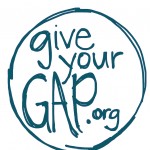 My name is Alyssa Llamas and I am a Public Health Associate for the Centers of Disease Control and Prevention (CDC). I am currently stationed at the Idaho Department of Health and Welfare (IDHW).
My name is Alyssa Llamas and I am a Public Health Associate for the Centers of Disease Control and Prevention (CDC). I am currently stationed at the Idaho Department of Health and Welfare (IDHW).
